

Showing Posts by Date: 09/2013
09.27.2013
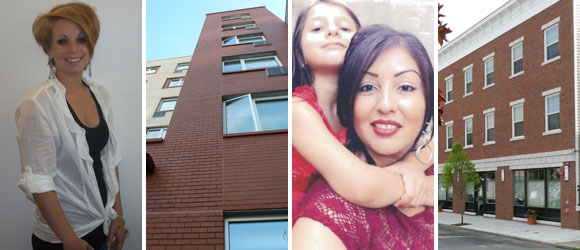
2013 Honorees (left to right): Shannon McEachern, True Colors Residence, Johanna Flores, Hill Street Inn
The Network is thrilled to announce the winners of its 2013 Tenant and Residence of the Year awards! The following buildings and individuals will be honored at our Awards Gala on Wednesday, October 16. These honorees will join three other award winners: Jason Helgerson (Government Partner of the Year), Frank Lipton (Tim O’Hanlon Unsung Hero of the Year) and Rick Lyon (Private Sector Partner of the Year).
To learn how you can attend our biggest party of the year, visit this page. We hope to see you at Capitale on October 16!
Award: NYC Residence of the Year
Nonprofit: West End Residences
Distinction: The nation’s first supportive housing residence for LGBT youth
Award: Upstate Residence of the Year
Nonprofit: Joseph’s House & Shelter
Distinction: A once-opposed residence becomes an anchor in the community
Award: Tenant of the Year
Nonprofit: Hour Children
Distinction: A formerly incarcerated woman helps mothers and children find stability
Award: Tenant of the Year
Nonprofit: YWCA of Binghamton and Broome County
Distinction: A chronically homeless woman becomes a powerful supportive housing advocate
09.26.2013
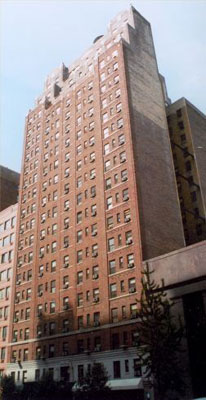 Over the past few months, the Network has fought to highlight the often-ignored effects of budget sequestration on low-income individuals and housing programs. In the below interview, we speak with Jim Dill, Executive Director of Housing & Services, Inc. (HSI), a supportive housing provider in New York City. Jim tells us about sequestration and its continued effects on HSI’s supportive housing residences and the vulnerable tenants they house. He speaks in particular about two residences: The Kenmore and The Cecil. To learn more about sequestration’s impact on the poor and formerly homeless, see our Sequestration Stories page.
Over the past few months, the Network has fought to highlight the often-ignored effects of budget sequestration on low-income individuals and housing programs. In the below interview, we speak with Jim Dill, Executive Director of Housing & Services, Inc. (HSI), a supportive housing provider in New York City. Jim tells us about sequestration and its continued effects on HSI’s supportive housing residences and the vulnerable tenants they house. He speaks in particular about two residences: The Kenmore and The Cecil. To learn more about sequestration’s impact on the poor and formerly homeless, see our Sequestration Stories page.
The Network: Kenmore Hall provides housing and services to 325 of New York’s most vulnerable citizens. How has sequestration impacted the well-being of the residence and its tenants?
Jim Dill: The Kenmore currently has seven vacant apartments attributable to sequestration. The sequester has led to a freeze on new tenant-based Section 8 vouchers. We are scrambling now to see if we can fill these empty units with another referral source. This is proving quite difficult, because tenants at Kenmore must meet HUD’s criteria for homelessness and have a rent subsidy. In the meantime, seven perfectly good apartments at the Kenmore remain vacant. Housing and services at this residence costs roughly $14,000 per year. That’s cheaper than any of the alternatives for New York’s most vulnerable: shelters, jails, hospitals, rehab, etc. It costs about $28,000 a year, for example, to house a single adult in a DHS shelter. That’s a $14,000 difference per person. With these seven vacancies, we could save the city at least $98,000 a year. Instead, because of sequestration, the apartments are just sitting there.
Has sequestration jeopardized the building’s day-to-day operations?
Yes. In accordance with our regulatory agreements, our tenants must have very low incomes and their rent is restricted to 30% of whatever they make. In the past, any rent increases would be funded through Section 8. Sequestration has frozen such rent increases.
Continue Reading … | New York City, Federal, Member News09.25.2013
 A supportive housing provider recognized by the Clinton Global Initiative (CGI) is in town TODAY and would love to meet the members of our community! You can RSVP to this impromptu event here.
A supportive housing provider recognized by the Clinton Global Initiative (CGI) is in town TODAY and would love to meet the members of our community! You can RSVP to this impromptu event here.
Step Up on Second is in NYC this week to attend the 2013 CGI Annual Meeting. We’ve worked together to arrange a casual gathering between Step Up and the members of the New York supportive housing community at a happy hour Tweetup TODAY at 6pm. Those in attendance will meet the Step Up executive team and members of its Board of Directors. Staff members from the Network will also be in attendance, as will other attendees of the CGI Annual Meeting. The first drink, “The CGI Special,” is on the house.
Step Up on Second is one of the Clinton Global Initiative’s 2010 Commitments to Action. This commitment is to create 200 units of supportive housing, using multiple green technologies in Hollywood, by 2014. As a result of this initiative, Step Up has hosted fundraisers with President Bill Clinton and Kobe Bryant, including one held earlier this year for a supportive housing project for transitional aged youth. You'll find video of President Clinton's speech from the event below.
See below for event details:
Continue Reading … | Network Events09.20.2013
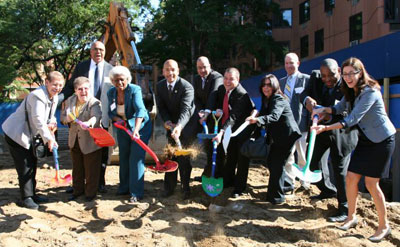 On September 19, Comunilife broke ground on El Rio, its forthcoming supportive housing residence in the Bronx. The building will house 39 formerly homeless individuals with mental illness and 26 low-income individuals.
On September 19, Comunilife broke ground on El Rio, its forthcoming supportive housing residence in the Bronx. The building will house 39 formerly homeless individuals with mental illness and 26 low-income individuals.
Upon completion in 2015, El Rio will mark Comunilife’s fourth supportive housing residence in New York City.
Thursday’s groundbreaking ceremony included a rich slate of guest speakers. Among those who took the podium were a number of elected officials, including Bronx Borough President Ruben Diaz, Jr., NYS Rep. Luis R. Sepúlveda, NYS Sen. Gustavo Rivera and a representative from the office of U.S. Rep. José Serrano. Also on hand to deliver remarks were Jessica Katz of the NYC Department of Housing Preservation and Development (HPD) and Comunilife President and CEO Dr. Rosa Gil.
HPD will provide Project Based Section 8 vouchers for the 39 formerly homeless residents living with mental illness. The remaining units will be available to individuals earning no more than 60% of the area median income (AMI). HPD will provide Low Income Housing Tax Credits, which will be syndicated by Red Stone Equity Partners. The agency will also provide federal HOME funding. The State will provide NYS Office of Temporary and Disability Assistance (OTDA) Homeless Housing and Assistance (HHAP) funding and the Bronx Borough President will provide nearly three quarters of a million dollars.
Congratulations to Comunilife on breaking ground on its latest supportive housing residence!
Photo caption: Partners gather at the groundbreaking for El Rio, a forthcoming supportive housing residence in the Bronx. Photo courtesy of Comunilife.
| Groundbreakings09.20.2013
 The Network cosponsored a special workshop earlier this week on how supportive and affordable housing developers can comply with the Davis-Bacon Act. The law, originally passed in 1931, dictates that contractors who help build federally-funded projects must pay their employees the local prevailing wage. We’ve just uploaded the presentation materials used at this workshop. You can now find PowerPoint slides from the following presenters (click each name to download): Camille Coppola of the U.S. Department of Labor, Jennifer Redmond of Goldstein Hall and Thomas Thacher of Thacher Associates, LLC. The event was cosponsored by Goldstein Hall.
The Network cosponsored a special workshop earlier this week on how supportive and affordable housing developers can comply with the Davis-Bacon Act. The law, originally passed in 1931, dictates that contractors who help build federally-funded projects must pay their employees the local prevailing wage. We’ve just uploaded the presentation materials used at this workshop. You can now find PowerPoint slides from the following presenters (click each name to download): Camille Coppola of the U.S. Department of Labor, Jennifer Redmond of Goldstein Hall and Thomas Thacher of Thacher Associates, LLC. The event was cosponsored by Goldstein Hall.
Presenters covered the basics of the Davis-Bacon law and the consequences of non-compliance. They offered practical steps that developers can take to protect themselves from wage disputes. They also discussed the importance of making sure that compliance expectations are written into the general contractor contract for every contractor on the job, the necessity of sign-in sheets and daily reports.
We thank everyone who attended this one-off workshop. For information on future Network-organized workshops and events, see our Upcoming Events page.
| Network Events09.17.2013
![]() Governor Andrew Cuomo issued a press release last week on New York’s efforts to house high-cost Medicaid users through the Medicaid Redesign Team (MRT) Supportive Housing Initiative.
Governor Andrew Cuomo issued a press release last week on New York’s efforts to house high-cost Medicaid users through the Medicaid Redesign Team (MRT) Supportive Housing Initiative.
The press release, available here, provides details on the $46.7 million in capital funding that the state has already awarded through the program. This funding will help develop 483 new units of supportive housing in 12 residences across the state.
The press release includes a quote from Jason Helgerson, New York State’s Medicaid Director and the soon-to-be recipient of the Government Partner of the Year award at our Awards Gala on October 16.
“There is compelling evidence, both in New York and nationally, that for people coping with chronic illness or disability and behavioral health challenges, the lack of stable housing often results in avoidable health care utilization and, in turn, avoidable Medicaid expenses,” Mr. Helgerson said. “There is a growing national recognition that addressing the social determinants of health is critical for improving health while reducing health care costs. This is most evident in the matter of housing.”
Congratulations to the Network members who’ve received awards:
Continue Reading … | New York State09.13.2013
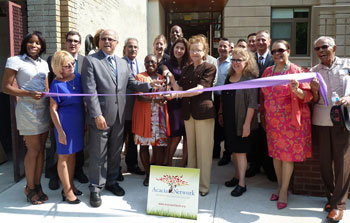 Some 50 staff, partners and supporters gathered on the roof of Mosholu Gardens to celebrate the opening of Acacia Network’s first supportive housing residence on September 12. This eight-story new construction overlooks Mosholu Parkway and provides 63 efficiency apartments for a mix of homeless and low-income individuals.
Some 50 staff, partners and supporters gathered on the roof of Mosholu Gardens to celebrate the opening of Acacia Network’s first supportive housing residence on September 12. This eight-story new construction overlooks Mosholu Parkway and provides 63 efficiency apartments for a mix of homeless and low-income individuals.
Ralph Declet, Acacia Network’s Vice President of Economic Development, acted as master of ceremonies for the day’s event. Mr. Declet introduced Acacia Network CEO Raul Russi and Board Chair Milagros Baez O’Toole, both of whom marveled at the beauty of the building and the teamwork that brought it into being. Jessica Katz, Assistant Commissioner for Special Needs Housing at the NYC Department of Housing Preservation and Development (HPD), thanked NYC Council Member Oliver Koppell and the members of Community Board 7 who supported the project. She also took a moment to point out that, although HPD had been able to make good on its commitments to this project, the department lost $42 million in Section 8 funding this year due to sequestration.
“Next time we might not be so lucky,” she said.
Continue Reading … | Member News, Openings09.10.2013
 Robert Carrion was ready to move on. A military veteran living in the Bronx, Robert had plans to relocate to Orlando with his girlfriend. He secured a Section 8 voucher and visited Florida to find an affordable apartment. He found an ideal spot and began preparations for his big move.
Robert Carrion was ready to move on. A military veteran living in the Bronx, Robert had plans to relocate to Orlando with his girlfriend. He secured a Section 8 voucher and visited Florida to find an affordable apartment. He found an ideal spot and began preparations for his big move.
It was then he got the call. Robert’s Section 8 voucher had been frozen. He held the phone, dumbfounded.
“I just thought, ‘What happened?’” Robert says. “That’s when I found out about sequestration.”
All across the country, sequestration has quietly affected the lives of low-income individuals like Robert. A result of the 2011 Budget Control Act, sequestration has forced the U.S. Department of Housing and Urban Development (HUD) to freeze the issuance of Section 8 vouchers.
For Robert, sequestration has cost him an apartment, his new life in Florida and, sadly, even his relationship. Taxpayers, meanwhile, will lose out as well. Robert must now remain at Fordham Village, a supportive housing residence for veterans run by the nonprofit Jericho Project. The final blow: Another homeless veteran, one who could have moved into Robert’s apartment at Fordham Village and stabilized his life enough to move on, will remain homeless as a result of sequestration.
Continue Reading … | New York City, Federal09.09.2013
 Our good friend Carol Corden of New Destiny Housing published an article over the weekend on the need to increase housing options for domestic violence survivors in New York City. You can read the piece, which ran in the New York Daily News, here.
Our good friend Carol Corden of New Destiny Housing published an article over the weekend on the need to increase housing options for domestic violence survivors in New York City. You can read the piece, which ran in the New York Daily News, here.
We couldn't agree more with Ms Corden's overall assessment. The piece comes just days before NYC's mayoral primary, and it urges the candidates to "think beyond temporary solutions and put investments towards long-term and proven policies, like permanent housing for survivors of domestic violence." Ms Corden places particular emphasis on the importance of support services to help these individuals achieve stability. "Supportive services that help place families on a path toward economic independence," she writes, "will also ease financial pressures on the City."
Ms Corden's article echoes the policy platform released by United to End Homelessness, a new coalition co-led by the Network. The group's platform, available here, calls for the creation of a new supportive housing agreement to address currently under-served New Yorkers, including domestic violence survivors.
We thank Ms Corden and the Daily News for highlighting this important issue!
| Press09.05.2013
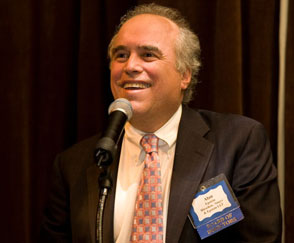 It is with enormous sadness that we report the passing of Alan Epstein, a longtime pillar of New York's supportive and affordable housing community. Alan lost his battle with cancer early yesterday morning on September 4. He was 56 years old.
It is with enormous sadness that we report the passing of Alan Epstein, a longtime pillar of New York's supportive and affordable housing community. Alan lost his battle with cancer early yesterday morning on September 4. He was 56 years old.
As a partner at Hirschen Singer & Epstein LLP, Alan devoted his professional life to helping supportive and affordable housing developers find new ways to build the homes needed to house the most vulnerable among us. In addition to his extraordinary legal work, Alan was Secretary of the Board of Directors of the Supportive Housing Network of New York, a mentor and a dear friend. It is difficult to express how much we will miss him.
Alan's innovative and energetic spirit often made it seem that anything was possible, that any residence could be built, despite the abundant challenges. His understanding of development law and finance helped ensure that supportive housing residences would be built with the resources and oversight that allowed them to become the much-admired housing model replicated across the country that supportive housing is today. Alan's guidance provided the foundation that allows New York now to build supportive housing on a scale that is finally beginning to approach the enormous need.
Alan's work dramatically improved the lives of thousands of New Yorkers. Just a few examples illustrate his considerable influence.
Continue Reading … |